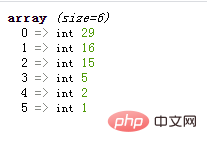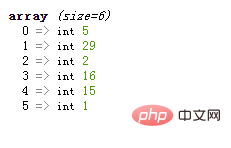 Backend Development
Backend Development
 PHP Tutorial
PHP Tutorial
 Tips for learning PHP arrays: Use array functions to sort arrays in descending order!
Tips for learning PHP arrays: Use array functions to sort arrays in descending order!
Tips for learning PHP arrays: Use array functions to sort arrays in descending order!
In the previous article "How to learn PHP arrays, use array functions to sort arrays in ascending order! ", we introduced the use of array functions sort(), asort(), ksort() to sort arrays in ascending order. Since there is ascending order, there is also descending order. So how to use the array function to sort the array in descending order? Let’s learn together below!
Similar to ascending sorting of arrays, there are three functions available for descending sorting of arrays, namely rsort(), arsort(), and krsort(). Let's first take a brief look at these three functions, and then use code examples to see how these array sorting functions perform descending sorting.
Three functions for sorting arrays in descending order:
rsort(): Sort array elements in descending order
- ##arsort( ): Sort the array in descending order according to the key value of the associative array
- krsort(): Sort the array in descending order according to the key name of the associative array
1. Use the rsort() function
rsort() function is used to sort the array elements in descending order, that is, from large to small and from high to low. Let’s take a look at the code example:<?php
header("Content-type:text/html;charset=utf-8");
$arr = array(2, 1, 5, 16, 29, 15);
rsort($arr);
var_dump($arr);
?>
rsort() function has two parameters: $array (required) and $sortingtype (can be omitted). The $sortingtype parameter is used to indicate the sorting mode. For specific values, please refer to theOutput result:sort() function in the previous article. Below, arsort() and krsort() also refer to the sort() function.
<?php header("Content-type:text/html;charset=utf-8"); $arr = array(2, 1, 5, 16, 29, 15); rsort($arr,2); var_dump($arr); ?>Copy after login

2. Use the arsort() function
The arsort() function will sort the associative array in descending order according to the key values and will not modify the key names in the original array. .<?php
header("Content-type:text/html;charset=utf-8");
$age = array("张三"=>30,"李四"=>23,"王五"=>15,"李华"=>12,"娜娜"=>26,"小红"=>16);
arsort($age);
var_dump($age);
arsort($age,2);
var_dump($age);
?>3. Use krsort() function
krsort() function will be based on The key names of the associative array are sorted in descending order, and the key names in the original array will not be modified.<?php
header("Content-type:text/html;charset=utf-8");
$arr= array("l"=>"lemon", "o"=>"orange", "b"=>"banana", "a"=>"apple");
krsort($arr);
var_dump($arr);
krsort($arr,1);
var_dump($arr);
?>PHP function array array function video explanation, come and learn!
The above is the detailed content of Tips for learning PHP arrays: Use array functions to sort arrays in descending order!. For more information, please follow other related articles on the PHP Chinese website!

Hot AI Tools

Undresser.AI Undress
AI-powered app for creating realistic nude photos

AI Clothes Remover
Online AI tool for removing clothes from photos.

Undress AI Tool
Undress images for free

Clothoff.io
AI clothes remover

Video Face Swap
Swap faces in any video effortlessly with our completely free AI face swap tool!

Hot Article

Hot Tools

Notepad++7.3.1
Easy-to-use and free code editor

SublimeText3 Chinese version
Chinese version, very easy to use

Zend Studio 13.0.1
Powerful PHP integrated development environment

Dreamweaver CS6
Visual web development tools

SublimeText3 Mac version
God-level code editing software (SublimeText3)

Hot Topics
 1667
1667
 14
14
 1426
1426
 52
52
 1328
1328
 25
25
 1273
1273
 29
29
 1255
1255
 24
24
 PHP: A Key Language for Web Development
Apr 13, 2025 am 12:08 AM
PHP: A Key Language for Web Development
Apr 13, 2025 am 12:08 AM
PHP is a scripting language widely used on the server side, especially suitable for web development. 1.PHP can embed HTML, process HTTP requests and responses, and supports a variety of databases. 2.PHP is used to generate dynamic web content, process form data, access databases, etc., with strong community support and open source resources. 3. PHP is an interpreted language, and the execution process includes lexical analysis, grammatical analysis, compilation and execution. 4.PHP can be combined with MySQL for advanced applications such as user registration systems. 5. When debugging PHP, you can use functions such as error_reporting() and var_dump(). 6. Optimize PHP code to use caching mechanisms, optimize database queries and use built-in functions. 7
 PHP and Python: Comparing Two Popular Programming Languages
Apr 14, 2025 am 12:13 AM
PHP and Python: Comparing Two Popular Programming Languages
Apr 14, 2025 am 12:13 AM
PHP and Python each have their own advantages, and choose according to project requirements. 1.PHP is suitable for web development, especially for rapid development and maintenance of websites. 2. Python is suitable for data science, machine learning and artificial intelligence, with concise syntax and suitable for beginners.
 PHP vs. Python: Understanding the Differences
Apr 11, 2025 am 12:15 AM
PHP vs. Python: Understanding the Differences
Apr 11, 2025 am 12:15 AM
PHP and Python each have their own advantages, and the choice should be based on project requirements. 1.PHP is suitable for web development, with simple syntax and high execution efficiency. 2. Python is suitable for data science and machine learning, with concise syntax and rich libraries.
 PHP in Action: Real-World Examples and Applications
Apr 14, 2025 am 12:19 AM
PHP in Action: Real-World Examples and Applications
Apr 14, 2025 am 12:19 AM
PHP is widely used in e-commerce, content management systems and API development. 1) E-commerce: used for shopping cart function and payment processing. 2) Content management system: used for dynamic content generation and user management. 3) API development: used for RESTful API development and API security. Through performance optimization and best practices, the efficiency and maintainability of PHP applications are improved.
 The Enduring Relevance of PHP: Is It Still Alive?
Apr 14, 2025 am 12:12 AM
The Enduring Relevance of PHP: Is It Still Alive?
Apr 14, 2025 am 12:12 AM
PHP is still dynamic and still occupies an important position in the field of modern programming. 1) PHP's simplicity and powerful community support make it widely used in web development; 2) Its flexibility and stability make it outstanding in handling web forms, database operations and file processing; 3) PHP is constantly evolving and optimizing, suitable for beginners and experienced developers.
 PHP vs. Other Languages: A Comparison
Apr 13, 2025 am 12:19 AM
PHP vs. Other Languages: A Comparison
Apr 13, 2025 am 12:19 AM
PHP is suitable for web development, especially in rapid development and processing dynamic content, but is not good at data science and enterprise-level applications. Compared with Python, PHP has more advantages in web development, but is not as good as Python in the field of data science; compared with Java, PHP performs worse in enterprise-level applications, but is more flexible in web development; compared with JavaScript, PHP is more concise in back-end development, but is not as good as JavaScript in front-end development.
 PHP and Python: Different Paradigms Explained
Apr 18, 2025 am 12:26 AM
PHP and Python: Different Paradigms Explained
Apr 18, 2025 am 12:26 AM
PHP is mainly procedural programming, but also supports object-oriented programming (OOP); Python supports a variety of paradigms, including OOP, functional and procedural programming. PHP is suitable for web development, and Python is suitable for a variety of applications such as data analysis and machine learning.
 PHP and Python: Code Examples and Comparison
Apr 15, 2025 am 12:07 AM
PHP and Python: Code Examples and Comparison
Apr 15, 2025 am 12:07 AM
PHP and Python have their own advantages and disadvantages, and the choice depends on project needs and personal preferences. 1.PHP is suitable for rapid development and maintenance of large-scale web applications. 2. Python dominates the field of data science and machine learning.





